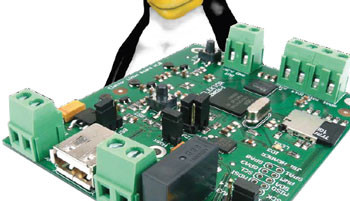Elektor presents: Embedded Linux Made Easy
on

Today Linux can be found running on all sorts of devices, from internet servers to coffee machines. Many electronics enthusiasts will be keen to use Linux as the basis of a new microcontroller project, but the apparent complexity of the operating system and the high price of development boards has been a hurdle. Here Elektor solves both these problems, with a beginners’ course accompanied by a compact and inexpensive circuit board.
There are many introductory courses available for eight-bit microcontrollers, but comparatively little literature and comparatively few websites address the needs of beginners in embedded Linux. In this beginners’ course you will learn where the most important applications and software components, the basis of our Linux system, originate from. You will also learn how the hardware is constructed and how it operates. The next step is to install a suitable Linux development environment on a PC to compile our own source code. By the end of the course you will be able to construct a simple heating controller with a graphical display and data analysis via a browser.
The hardware will be a compact, populated and tested, board that includes everything necessary for a modern embedded project: a USB interface, an SD card connection and various other expansion options. It is also easy to hook the board up to an Ethernet network.
Features of the Elektor Linux board:
• Two-layer board using readily-available components
• No special debugging or programming hardware required
• Fully bootable from an SD memory card
• Linux pre-installed
• 180 MHz ARM9 MCU, 8 MB RAM (32 MB optional), 64 MB swap
• Integrated USB-to-RS-232 converter for console access
• Relay, external power supply, and pushbuttons for quick testing
• Four GPIO pins, 3 A/D channels and a PWM channel
• I²C and SPI buses accessible from Linux
• USB interface for further expansion



Discussion (0 comments)